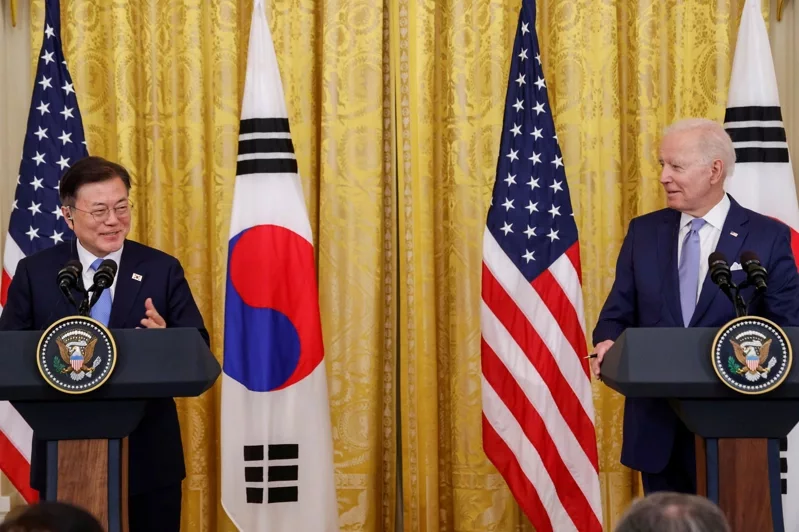
Is Taiwan a Beggar Sitting on a Pile of Gold?
Numerous scandals and a worsening pandemic situation in South Korea have caused a decline in President Moon Jae-in’s approval ratings, so he hoped to improve his situation with a visit to the U.S. A few days ago, he led members of the business community on a trip to America, where he announced that South Korea would increase investment in American semiconductors and fields related to electric vehicles. In exchange, the U.S. would provide vaccines to 550,000 active duty South Korean soldiers. Furthermore, Moderna, the pharmaceutical company producing mRNA vaccines, also announced that it would entrust Samsung Biologics to manufacture its vaccine. South Korea will once more have obtained an original equipment manufacturer agreement with another international vaccine manufacturer, in addition to AstraZeneca and Novavax. This will enable the country to become a major hub in international vaccine manufacturing.
In fact, South Korean business investments in the U.S., including Samsung’s wafer plant in Austin, the LG Energy Solution battery plant and the Hyundai Motor Company’s electric vehicle plant, have long been finalized and were not part of the recent U.S.-South Korean summit. But by using this trip to the U.S. to again announce predetermined investments, big Korean businesses obtained manufacturing contracts for critical key industries, reaping great benefits in doing so. Still, some scholars fear that by being forced to declare his position on the issue of the Taiwan Strait, Moon offended China. However, surely Moon understands this. Perhaps he actually revealed what the popular sentiment is in South Korea.
President Tsai Ing-wen and the Democratic Progressive Party claimed many times during Donald Trump’s presidency that Taiwan-U.S. relations were at their best. Since Joe Biden took office, there has been almost no change. In a trip to Taiwan in April, former Sen. Chris Dodd told Tsai that “the United States’ partnership with Taiwan is stronger than ever.”
Yet so far, the U.S. has only given verbal commitments. Although Congress has passed a series of acts favorable to Taiwan, the actual benefits Taiwan will receive are quite limited. The U.S. has pushed Taiwan to the front line as a vanguard against communism and constantly warns of an increased probability that China with forcefully reunite Taiwan with the mainland. However, the U.S. remains unwilling to sell Taiwan advanced weapons. And although the Tsai administration actively proposed opening the country to imported American lean pork, which contains possibly unsafe additives, and also announced they could promote a Taiwan-U.S. bilateral trade agreement, currently, there are no plans to even resume meeting about a trade and investment framework agreement.
Last March, Taiwan and the U.S. signed the Taiwan-U.S. Joint Statement on a Partnership Against Coronavirus. They stated that with this partnership, they would share best practices and collaborate on pandemic-prevention measures, such as vaccine research and production. However, so far, the U.S. has only offered raw materials for personal protective clothing, made exchanges for Taiwan’s masks, and assisted allies in obtaining vaccines. Furthermore, as the pandemic has worsened in Taiwan, the U.S. has offered no help. On May 21, Health and Human Services Secretary Xavier Becerra and Taiwan’s Health and Welfare Minister Chen Shih-chung conducted a video meeting in which Becerra said that the U.S. “supports” Taiwan in obtaining vaccines, but did not commit to releasing vaccines from America’s stockpile. On the contrary, Korea, a country unwilling to offend China, has become the target of U.S. enticement. Consider the proverb, “Give someone a fish and you feed them for a day; teach them to fish and you feed them for a lifetime.” The U.S. has not only given Korea fish in the form of vaccine, but taught it how to fish by giving it the ability to produce vaccines.
While the U.S. still has considerable influence in the field of conductors, except for a few companies such as Intel, it chooses to outsource chip manufacturing. According to the market research firm TrendForce, Taiwan accounted for 65% of the estimated overall wafer manufacturing market performance in April 2021; of that, Taiwan Semiconductor Manufacturing Company accounted for 55%. By contrast, the Korean market only accounted for 18%.
The disparity between Taiwan’s and Korea’s influence in semiconductor manufacturing is quite large, but Taiwan is like a beggar sitting on a pile of gold: it doesn’t know how to use its own advantage. From South Korea’s experience, we know that a country that obeys America’s every command like a dog will not obtain its respect; instead, South Korea made good use of its political and valuable economic advantages. In terms of politics, Taiwan should get closer to China and walk both sides with strategic ambiguity. In addition, Taiwan should not always accommodate America’s urgent chip orders so that the U.S. will understand the influence we hold in the industry. This will make the U.S. start to take Taiwan seriously.
